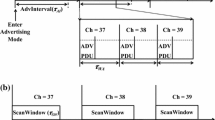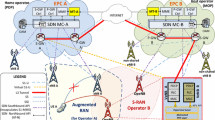Abstract
The Bluetooth specification defines the notion of interconnected piconets, called scatternets, but does not define the actual mechanisms and algorithms necessary to set up and maintain them. The operation of a scatternet requires some Bluetooth units to be inter-piconet units (gateways), which need to time-division multiplex their presence among their piconets. This requires a scatternet-scheduling algorithm that can schedule the presence of these units in an efficient manner. In this paper, we propose a distributed scatternet-scheduling scheme that is implemented using the HOLD mode of Bluetooth and adapts to non-uniform and changing traffic. Another attribute of the scheme is that it results in fair allocation of bandwidth to each Bluetooth unit. This scheme provides an integrated solution for both intra- and inter-piconet scheduling, i.e., for polling of slaves and scheduling of gateways.
Similar content being viewed by others
References
S. Baatz, M. Frank, C. Kehl, P. Martini and C. Scholz, Adaptive scatternet support for Bluetooth using sniff mode, in: Proc. of IEEE LCN (2001).
A. Das, A. Ghose, A. Razdan, H. Saran and R. Shorey, Enhancing performance of asynchronous data traffic over the Bluetooth wireless ad-hoc network, in: Proc. of IEEE INFOCOM'2001 (2001).
J. Haartsen, BLUETOOTH — the universal radio interface for ad hoc wireless connectivity, Ericsson Review 3 (1998) 110–117.
P. Johansson, M. Kazantzidis, R. Kapoor and M. Gerla, Bluetooth — an enabler for personal area networking, IEEE Network Magazine, Wireless Personal Area Network (September 2001).
M. Kalia, D. Bansal and R. Shorey, MAC scheduling and SAR policies for Bluetooth: A master driven TDD pico-cellular wireless system, in: Proc. of 6th IEEE International Workshop on Mobile Multimedia Communications (MOMUC) (1999).
R. Kapoor, L. Chen, Y. Lee and M. Gerla, Bluetooth: carrying voice over ACL links, in: Proc. of MWCN (2002).
A. Mayer, Y. Ofek and M. Yung, Approximating max-min fair rates via distributed local scheduling with partial information, in: Proc. of IEEE INFOCOM (1996).
NS-2 simulator, http://www.isi.edu/nsnam/ns/
A. Racz, G. Miklos, F. Kubinszky and A. Valko, A pseudo-random coordinated scheduling algorithm for Bluetooth scatternets, in: Proc. of MobiHoc (2001).
Specifications of the Bluetooth System — core, Vol. 1, v. 1.1, www. Bluetooth.com
W. Zhang and G. Cao, A flexible scatternet-wide scheduling algorithm for Bluetooth networks, in: Proc. of IEEE IPCCC (2002).
Author information
Authors and Affiliations
Rights and permissions
About this article
Cite this article
Kapoor, R., Zanella, A. & Gerla, M. A Fair and Traffic Dependent Scheduling Algorithm for Bluetooth Scatternets. Mobile Networks and Applications 9, 9–20 (2004). https://doi.org/10.1023/A:1027309521047
Issue Date:
DOI: https://doi.org/10.1023/A:1027309521047




